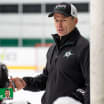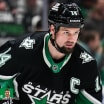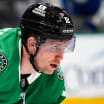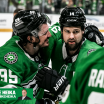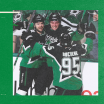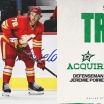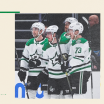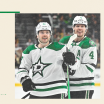Stars look for turnaround on special teams
Dallas should get a boost on the power play and penalty kill with new coaching and personnel
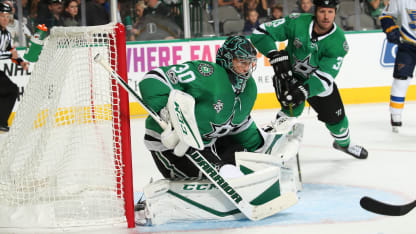
From 2011 to 2017, over the course of 413 regular season games with Hitchcock at the helm, the Blues hit on 20.5 percent of their power plays, ranking fourth in the NHL. On the penalty kill, they clicked along at 85.1 percent, tops in the league.
Now that Hitchcock is in Dallas, he'll try to get the Stars' special teams performing at a high level. And take note of those power play and penalty kill percentages in St. Louis because those tell the tale of Hitchcock's goal.
"People think you need a good power play and a good penalty kill, but what you need is a number," Hitchcock said. "There is a critical number that when the two (power play and penalty kill percentages) add up, that if you expect to have success, you've got to be at 105 or better."
So, that 20.5 percent on the power play and 85.1 percent on the penalty kill over his six years in St. Louis is on target since it adds up to 105.6.
"Being at 105 throughout the season, however we get there, that is where we want to be," Hitchcock said. "Pretty much across the board, any team that is consistently at 105 or within a point of 105, makes the playoffs."
Hitchcock has some work to do in Dallas. Special teams were rough on the Stars last season. The power play ranked 20th in the league at 17.9 percent, and the penalty kill was dead last in the NHL at 73.9 percent. The combined power play and penalty percentages came in at 91.8, nowhere near Hitchcock's target number of 105.
Special teams always are important but could be more significant this year with the league looking at a crackdown on slashing penalties and faceoff violations.
"We need to get our power play and penalty kill back on track," said Stars captain Jamie Benn. "With these changes of rules, we need to take advantage of every opportunity we get. We don't want to be on the wrong side of it."
The power play, which will be handled by Hitchcock and assistant coach Stu Barnes, should get a boost this season with Alexander Radulov and Martin Hanzal coming into the mix. Throw in Benn, Tyler Seguin, Jason Spezza and John Klingberg, and there is a lot of skill to roll out when the Stars have the man advantage. But Hitchcock said skill alone won't get it done for the Stars, and that will be the key to improvement.
"We think we have the skill, but that is 50 percent of what the power play is. The power play is all about retrieving pucks, scoring dirty goals," Hitchcock said. "The top seven teams on the power play over the last two years have the same common denominator -- they score dirty goals. They score hard-working, crash-the-net, traffic goals. Do we have skill to make plays? Sure, a lot of teams do. Do we have the fortitude to go and stand in the way of the puck and hang in there longer than the opposition? That's something we are going to have to find out."
Klingberg agrees the Stars need to get a little dirty when it comes to the power play. Too much reliance on the pretty and not enough gritty.
"For sure. We're always looking for the pretty play, the open net all the time," Klingberg said. "The PK is not just standing around anymore; it's pressure all the time. It's hard. You have to put the puck through the blockers onto the net and then have at least two or three guys coming into the net, and then one be there before the shot is there. We need to be more dirty there."
The Stars will hone in on the power play over the next week, so the units should come into focus as well as the approach.
"I think [Hitchcock] likes the shot, get it back mentality especially early in power plays, so I think that is something that will change for us," Spezza said. "And we may have some different pieces they didn't have in other places. It's going to be a little bit of a work in progress, but it has all the makings of a good power play."
The penalty kill was a major sore spot in 2016-17. The 73.9 percent success rate was among the worst in the NHL in recent years, and it was a key factor in the Stars' inflated goals against average. Losing some key penalty killers due to roster turnover didn't help last season, and goaltending ups and downs didn't help either. But the Stars have struggled on the penalty kill over the past few years, ranking 28th in the league from 2013-14 to 2016-17 at 79.6 percent.
"It will be fixed quickly," Hitchcock said of the penalty kill. "I don't want to say it's going to be the easiest, but there will be a dramatic change in the penalty killing immediately because you've got two coaches who know what they are doing on killing penalties. Between [assistant coach] Rick [Wilson] and myself, we have the same belief system, and we'll see a dramatic uptick in the penalty killing right away."
Wilson said the Stars penalty kill last season wasn't as bad as the numbers indicate, adding that stats can be misleading on both sides of special teams. Confidence can go up and down, and that can be a factor. But there will be some adjustments.
"They were doing a lot of things here before that we'll keep doing. Maybe we'll get a little more help in some areas, whether it is on the faceoff dot, or a stop here or there when you need it," Wilson said. "Even the best penalty units will break down because you are playing against really good players. You need a stop. Sometimes you get them and sometimes you don't."
The penalty kill will get some help by adding Hanzal, defenseman Marc Methot, and goaltender Ben Bishop. Seguin will get a penalty-killing role this season. Hitchcock said Seguin can't be a No. 1 center and not kill penalties.
Seguin, who has been seeing penalty kill time in the preseason, is on board.
"It's something I've enjoyed so far, and I've love to be a part of it," said Seguin. "I want to earn that role. It's going to come with being better on faceoffs, knowing my position and using my speed. I hope to keep getting an opportunity there."
Faceoffs will be one key along with a lot of other little things.
"Consistency. Simplicity. Sacrifice," said defenseman Dan Hamhuis. "Making sure those pucks are getting down. I think we took a lot of chances last year looking for offense and we got burned a couple of times. It's willingness to block shots and knowing your roles out there."
Wilson said it's a matter of being good at what you do and making the opposition's power play nervous about what you are doing.
"It's trying to get them all on the same page," Wilson said, "believing in themselves, trusting each other and go trucking."
And the hope is some special teams success will help drive overall success for the Stars.
This story was not subject to approval of the National Hockey League or Dallas Stars Hockey Club. Mark Stepneski is an independent writer whose posts on DallasStars.com reflect his own opinions and do not represent official statements from the Dallas Stars. You can follow Mark on Twitter @StarsInsideEdge.


